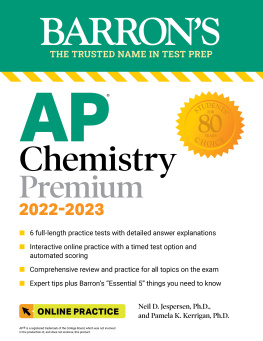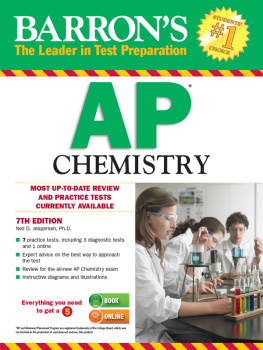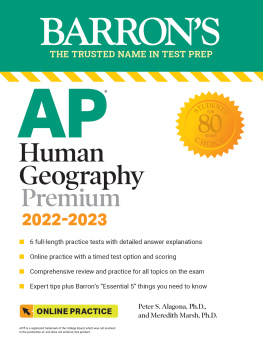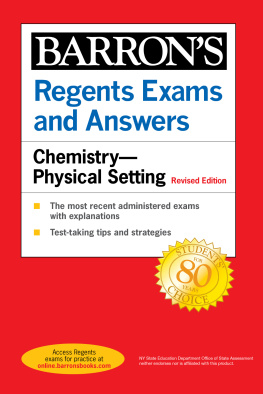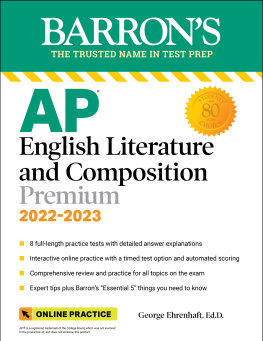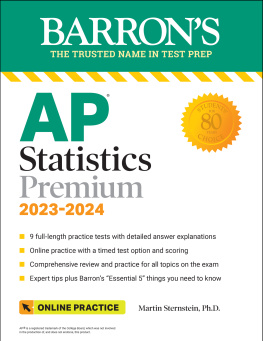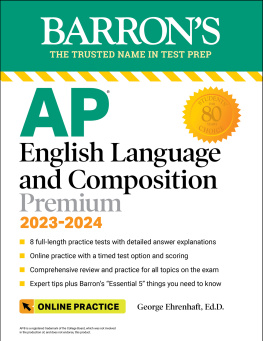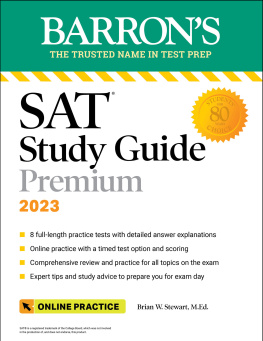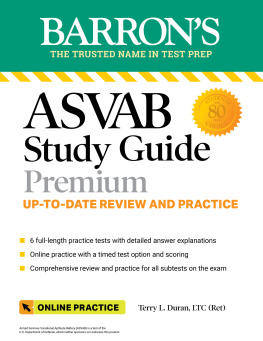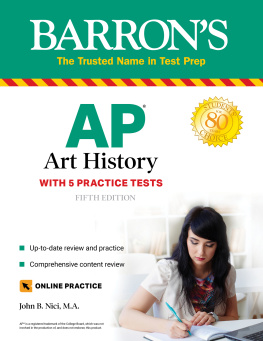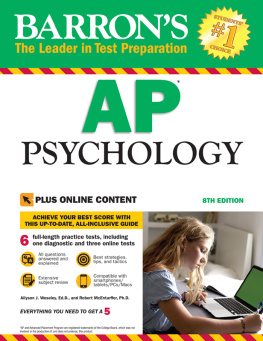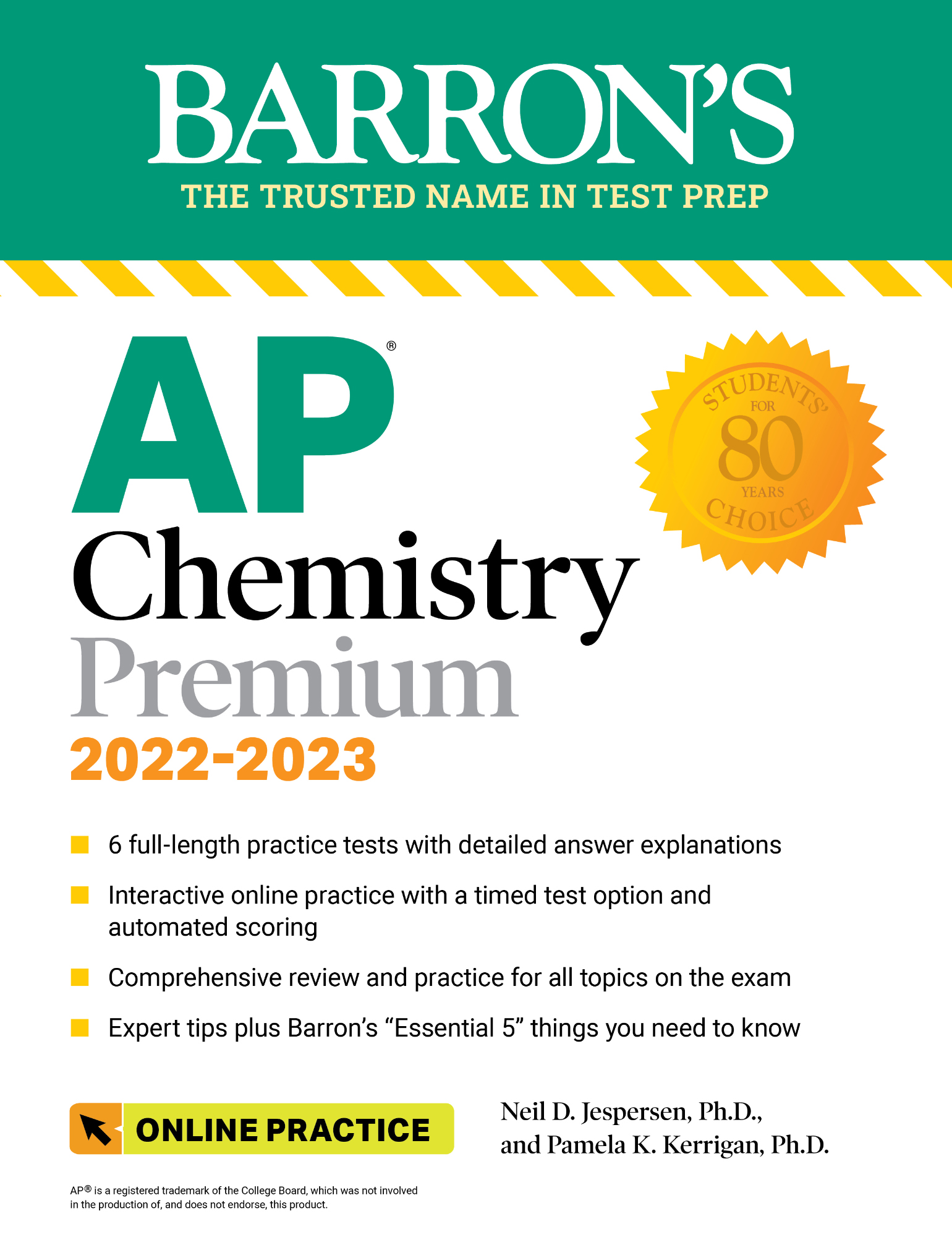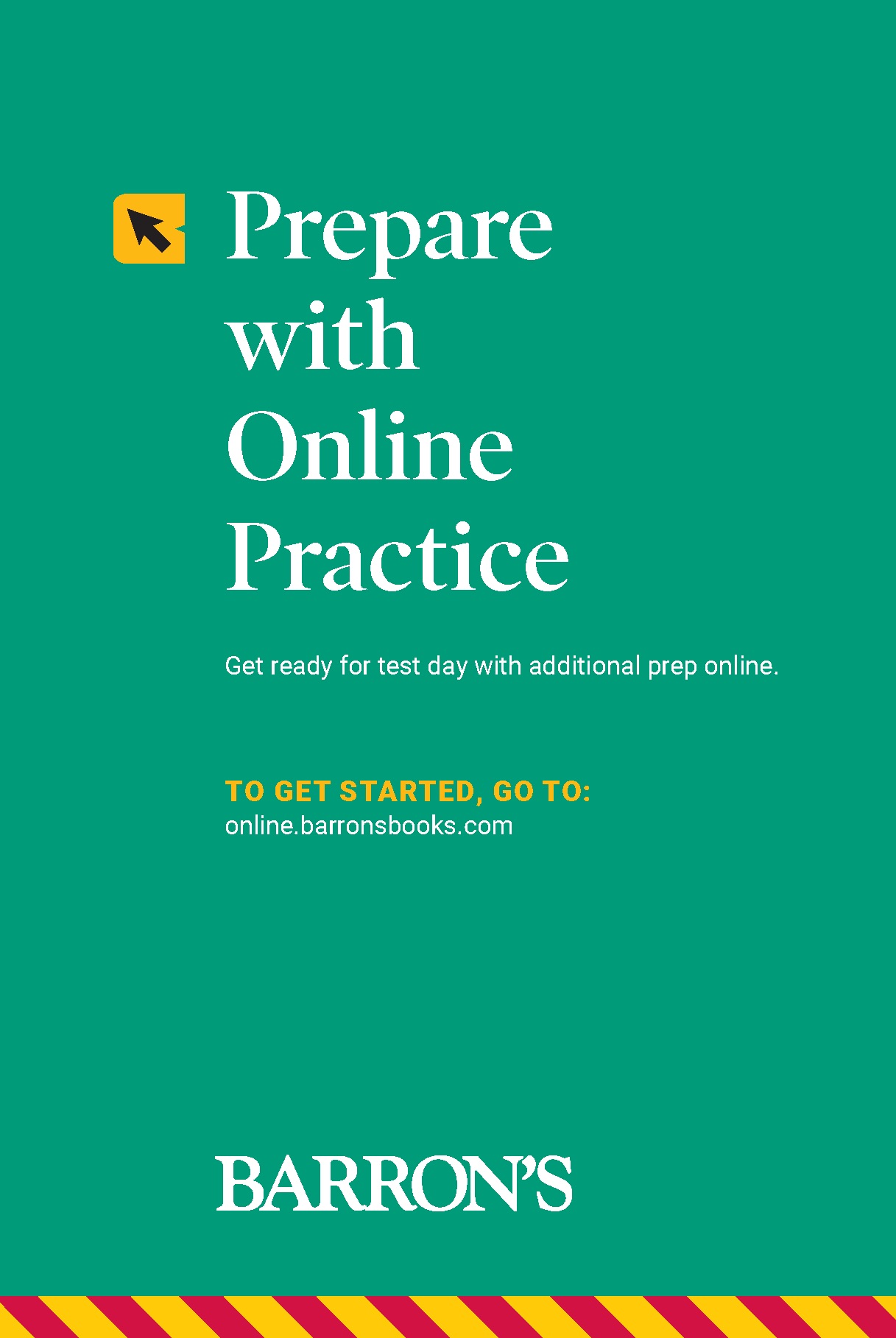
AP
Chemistry
Premium
20222023
Neil D. Jespersen, Ph.D.
Professor of Chemistry (retired)
St. Johns University
Jamaica, New York
Pamela K. Kerrigan, Ph.D.
Professor, Biochemistry
College of Mount Saint Vincent
Riverdale, New York
AP is a registered trademark of the College Board, which was not involved in the production of, and does not endorse, this product.
About the Authors
Neil D. Jespersen is an active member of the Department of Chemistry at St. Johns University (Queens, New York). He earned his B.S. degree with special attainments in chemistry at Washington and Lee University (Lexington, Virginia) and his Ph.D. at Pennsylvania State University (University Park, Pennsylvania). He specializes in analytical chemistry research and has mentored more than 100 undergraduate research students and 25 graduate students. Dr. Jespersen taught graduate and undergraduate courses in instrumental analysis and quantitative chemical analysis. He also taught general chemistry on a regular basis and coordinated the general chemistry laboratory program. Dr. Jespersen is a fellow of the American Chemical Society and currently serves as a councilor from the New York ACS section. He was also the faculty advisor to the ACS Student Chapter at St. Johns University for over thirty years.
Pamela K. Kerrigan is a professor and director of the Division of Natural Sciences at the College of Mount Saint Vincent (Bronx, New York). She earned her B.A. at Lakeland College as a double major in biology and chemistry, her M.S. at the University of Wisconsin (Milwaukee), and her Ph.D. at Arizona State University in chemistry. Over the past 26 years, Dr. Kerrigan has mentored numerous undergraduate research students. She teaches undergraduate courses in general chemistry, organic chemistry, and biochemistry. Dr. Kerrigan is the past chair of the New York section of the American Chemical Society and is a councilor. During her tenure at the college, she has been the mentor for the American Chemical Society Student Chapter. For 10 years, Dr. Kerrigan was a reader for the AP Chemistry exam.
Copyright 2021, 2018, 2016, 2014, 2012, 2010, 2007 by Kaplan, Inc., d/b/a Barrons Educational Series
Previous editions Copyright 2003, 1999, 1995 by Kaplan, Inc., d/b/a Barrons Educational Series, under the title How to Prepare for the AP Chemistry Advanced Placement Examination
All rights reserved under International and Pan-American Copyright Conventions. By payment of the required fees, you have been granted the non-exclusive, non-transferable right to access and read the text of this eBook on screen. No part of this text may be reproduced, transmitted, downloaded, decompiled, reverse engineered, or stored in or introduced into any information storage and retrieval system, in any form or by any means, whether electronic or mechanical, now known or hereinafter invented, without the express written permission of the publisher.
Published by Kaplan, Inc., d/b/a Barrons Educational Series
750 Third Avenue
New York, NY 10017
www.barronseduc.com
ISBN: 978-1-5062-6413-4
10 9 8 7 6 5 4 3 2 1
Kaplan, Inc., d/b/a Barrons Educational Series print books are available at special quantity discounts to use for sales promotions, employee premiums, or educational purposes. For more information or to purchase books, please call the Simon & Schuster special sales department at 866-506-1949.
Barrons Essential 5
As you review the content in this book and work toward earning that on your AP CHEMISTRY exam, here are five things that you MUST know above everything else.
- Knowing the basics is universally important. Writing formulas and naming them, writing and balancing chemical equations, counting atoms, and determining molar masses along with proper use of significant figures are the little things that make a big difference between a 4 and a 5! Knowing the basics well also speeds your work so you will seem to have more time for the tough questions. Basic theories of chemistry require an understanding that can be applied to explaining chemical principles. These include the atomic theory, acidbase theories (Arrhenius and Brnsted-Lowry), VSEPR theory, kinetic molecular theory, collision theory, and transition state theory.
- Atomic and molecular structures are fundamental to explaining many of the physical and chemical properties of substances. Atomic structure involves electron configurations and helps explain relationships within the periodic table. Molecular structure involves Lewis structures and VSEPR theory to obtain three-dimensional shapes and polarities. Polarity, or the lack of polarity, is the fundamental feature that allows the assessment of the strengths of intermolecular forces of attraction that then allows the explanation of many physical properties.
- Stoichiometric calculations are used to solve many AP Chemistry problems. These problems include questions on how much of one substance reacts with another, limiting reactant calculations, titration calculations, and empirical formula calculations.
- Principles of chemical kinetics, chemical equilibrium, and thermodynamics are used to explain and/or solve many questions. Chemical kinetics describes what happens as substances react and is used to deduce what happens during a chemical reaction. A dynamic equilibrium is the state that occurs after chemical change has ceased and may be used to determine the extent of reaction or the composition of the equilibrium mixture. The approaches for kinetics and equilibrium are distinctly different and must not be confused. Thermodynamics explains why chemical reactions occur in terms of changes in potential and kinetic energies. Thermodynamics also provides methods for relating the Gibbs free energy with equilibrium constants and galvanic (voltaic) cell voltages.
- Representation and interpretation of the concepts and facts of chemistry are necessary skills. In todays world, representations are used to explain complex issues and procedures. The AP Chemistry course embraces this thought. You will find many common chemistry ideas translated to representations of the microscopic/molecular world. Interpretation of data, or evidence, is another skill developed by taking an AP course. It is essential that students learn to correctly interpret what they are observing. Reviewing a graph, table of data, or representation of the molecular world and coming to a reasonable conclusion about its meaning is an essential skill in this complex world.
Preface
You are about to embark on one of the more intellectually challenging experiences of your life, the Advanced Placement Examination in Chemistry. Fewer than 1 percent of all high school students take this exam. Whatever the outcome, you are to be congratulated as one of a select group. As a conscientious student, you can use this review book to help you increase your score. A higher score can lead to college course credit and a head start in your selected career.
You may find that the AP Examination in Chemistry is different from other exams and tests that you have taken. Explain, compare, and predict are three important words often used on the AP Chemistry exam. Remembered facts and calculation procedures are the basic groundwork of chemistry; however, high scores require a thorough understanding of fundamental chemical principles and relationships. Chemistry is rich in these relationships. The key to success on the exam is to think like a chemist and to apply your knowledge of one or more basic principles to provide a logical description of how atoms, ions, and molecules behave.

